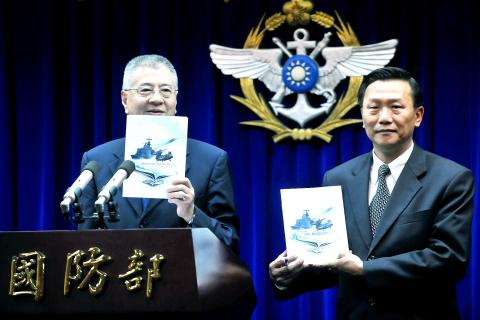The Ministry of National Defense yesterday released its quadrennial defense review (QDR) in which the ministry warned of a rising Chinese military threat, but omitted provocative wording that might anger Beijing.
The long-awaited report was the second published by the ministry, which is required by law to submit a QDR to the legislature within 10 months of every presidential inauguration.
While tensions across the Taiwan Strait have been at their lowest in six decades, China’s military threat remains strong because its strategy is to “rapidly end an island conflict and reduce the possibility of foreign interference.”

Photo: Mandy Cheng, AFP
China now possesses the ability to impose a partial blockade of Taiwan and to conduct “anti-access/area denial” operations in certain areas, the review said.
Minister of National Defense Kao Hua-chu (高華柱) held a briefing on the 70-page report — which was similar to the 2009 edition in its content, despite being dozens of pages shorter — to legislators yesterday morning.
Lawmakers questioned a number of points, including the ministry’s change of stance on proposed military confidence-building measures between Taiwan and China.
Kao said there is a lack of a public consensus on signing a cross-strait peace agreement and confidence-building measures, so a hasty move toward the initiatives would be risky.
The ministry’s position was different in 2009, when it appeared to be more positive about confidence-building measures.
Department of Strategic Planning Director-General Cheng Yun-peng (成雲鵬) said at a press conference yesterday afternoon that military mutual trust would be meaningless without mutual trust on political affairs, while Deputy Minister of National Defense Andrew Yang (楊念祖) said that the confidence-building measures should be seen as building blocks.
The ministry did not explain why the report does not mention asymmetrical warfare capability, a topic which occupied an entire chapter in the 2009 review, in which it was stated that Taiwan would “make decisive attacks” to counter China if necessary.
The report contained four chapters on the security environment and national defense challenges; national defense policy and strategic guidance; joint warfare capabilities and preparedness; as well as defense organization and transformation.
Lawmakers and observers were also concerned about the all-voluntary military service system, which the ministry had pledged to achieve by next year, but which it has now postponed until 2016 due to a lack of resources and a poor recruitment record.
The ministry said the military personnel target would be about 215,000 to avoid personnel shortages, despite recruitment having been hit hard by financial difficulties.
In response to a media report which, quoting Chinese Nationalist Party (KMT) Legislator Lin Yu-fang (林郁方), said the military is considering relaunching a domestic project to manufacture third-generation domestic fighter jets, Kao said Taiwan has been purchasing arms from the US because they cannot be manufactured domestically.
However, he said that Taiwan is trying to make domestic production of unmanned combat air vehicles possible, adding that Washington has yet to respond to requests for assistance in the domestic production of various weapons systems.

Right-wing political scientist Laura Fernandez on Sunday won Costa Rica’s presidential election by a landslide, after promising to crack down on rising violence linked to the cocaine trade. Fernandez’s nearest rival, economist Alvaro Ramos, conceded defeat as results showed the ruling party far exceeding the threshold of 40 percent needed to avoid a runoff. With 94 percent of polling stations counted, the political heir of outgoing Costa Rican President Rodrigo Chaves had captured 48.3 percent of the vote compared with Ramos’ 33.4 percent, the Supreme Electoral Tribunal said. As soon as the first results were announced, members of Fernandez’s Sovereign People’s Party

MORE RESPONSIBILITY: Draftees would be expected to fight alongside professional soldiers, likely requiring the transformation of some training brigades into combat units The armed forces are to start incorporating new conscripts into combined arms brigades this year to enhance combat readiness, the Executive Yuan’s latest policy report said. The new policy would affect Taiwanese men entering the military for their compulsory service, which was extended to one year under reforms by then-president Tsai Ing-wen (蔡英文) in 2022. The conscripts would be trained to operate machine guns, uncrewed aerial vehicles, anti-tank guided missile launchers and Stinger air defense systems, the report said, adding that the basic training would be lengthened to eight weeks. After basic training, conscripts would be sorted into infantry battalions that would take

GROWING AMBITIONS: The scale and tempo of the operations show that the Strait has become the core theater for China to expand its security interests, the report said Chinese military aircraft incursions around Taiwan have surged nearly 15-fold over the past five years, according to a report released yesterday by the Democratic Progressive Party’s (DPP) Department of China Affairs. Sorties in the Taiwan Strait were previously irregular, totaling 380 in 2020, but have since evolved into routine operations, the report showed. “This demonstrates that the Taiwan Strait has become both the starting point and testing ground for Beijing’s expansionist ambitions,” it said. Driven by military expansionism, China is systematically pursuing actions aimed at altering the regional “status quo,” the department said, adding that Taiwan represents the most critical link in China’s

‘REALLY PROUD’: Nvidia would not be possible without Taiwan, Huang said, adding that TSMC would be increasing its capacity by 100 percent Nvidia Corp CEO Jensen Huang (黃仁勳) on Saturday praised and lightly cajoled his major Taiwanese suppliers to produce more to help power strong demand for artificial intelligence (AI), capping a visit to the country of his birth, where he has been mobbed by adoring fans at every step. Speaking at an impromptu press conference in the rain outside a Taipei restaurant, where he had hosted suppliers for a “trillion-dollar dinner,” named after the market capitalization of those firms attending, Huang said this would be another good year for business. “TSMC needs to work very hard this year because I need a lot